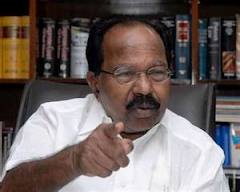
New Delhi, July 26: Congress ministers Thursday slammed Gujarat Chief Minister Narendra Modi for his remark "Hang me if I am guilty" with reference to the 2002 riots in the state, terming it "highly reprehensible and irresponsible".
In an interview to Urdu weekly Nai Duniya, Modi said "Hang me if I am guilty ('Main gunehgaar hoon toh mujhe phaansi par latkaa do')" on the Gujarat riots.
Modi, a Bharatiya Janata Party (BJP) leader, has been accused of giving tacit support to the riots in which more than 1,000 Muslims were killed following the Feb 27, 2002, Godhra train burning incident in which 57 'kar sewaks' returning from Ayodhya were burnt alive.
Union Corporate Affairs Minister M. Veerappa Moily, reacting to Modi's remark, said it was for the judiciary to decide on the guilty and take appropriate steps to punish them.
Asked if Modi's remark was aimed at appeasing the minorities, Moily said: "I don't know whether it is to appease minorities. But I think it is highly reprehensible and irresponsible".
Union Law Minister Salman Khurshid, taking a dig at Modi, said if the Gujarat chief minister was aiming to change his image with such a remark, it would be better to change his behaviour and role instead.
Khurshid told reporters: "I don't think we believe in kangaroo justice. Whatever the law is in the country will prevail. The courts will decide. The agencies that are working for the courts will have to decide, place the material before the court, and the court will take a decision."
"I don't think that we either in the streets can decide or that Modi can take a decision by himself," he said.
"We all have faith in the courts of the land and we will wait for the courts to say what they believe is the right thing to do," he said.
Asked if Modi's remark was aimed at a pro-minority image, Khurshid said: "If he wants to improve his image, let him. But I feel he should change his behaviour and his role (kirdar). That will be the best. Changing image will not help."
Modi's interview in Nai Duniya was conducted by Shahid Siddiqui, a former Rajya Sabha member from the Samajwadi Party.
The interview dealt with the post-Godhra riots, the state of Muslims in Gujarat and other sensitive issues.




Comments
Add new comment